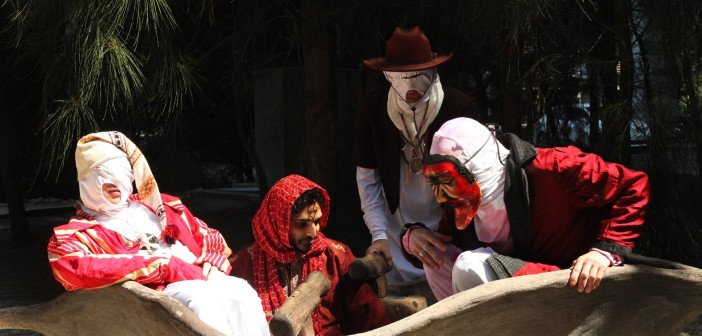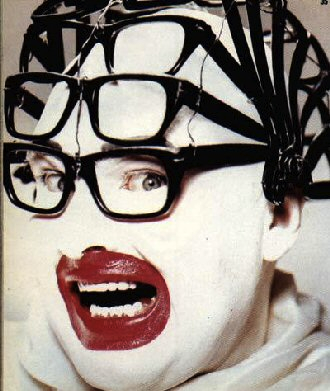Surrealist multi-ethnic Melbourne hip hop group Curse ov Dialect (MCs Raceless, Vulk Makedonski and Aturungi, and DJ/producer Paso Bionic) is back after an almost 7 year interval with Twisted Strangers (Consume/Valve Records) , their first album since 2009’s Crisis Tales, on avant-garde label Staubgold, which they supported with a live DVD featuring their outrageous, outlandishly-costumed performances of tracks from that album, and extensive tours of Europe, Japan and North America. Coming from Maltese, Macedonian, Māori and Pakistani backgrounds, they remain the most ethnically diverse hip hop group in Australia, and possibly the world, and continue to push the boundaries of musical samples to ever more remote places around the world, while their rapid-fire scattershot rapping is as ballistically multivocal as ever. Considered too avant-garde by many hip hop heads, they continue on their ground-breaking path with the new album, which rewards multiple listenings in terms of deciphering the constant barrage of musical and verbal extracts and raps from their ever-surprising trio of MCs. I spoke with Raceless on email:
Tony Mitchell: It’s now 7 years since your last release ‘Crisis Tales’, and you’re now 40 years old, Curse has been going for more than 20 years, and you’re down to 4 members. What’s been happening over the past 7 years?
Raceless: Some of us are parents now and some of us have lived overseas etc. etc. .. Yes, being 40 gives you a grown man way of doing hip hop … August the 2nd left on positive terms to do work one on one with talking engagements on personal growth … but the call of the curse came back slowly but surely… the therapy for sanity continues. In this racist bigoted climate the world is in at the moment Curse ov Dialect’s reason to exist continues as this was the main reason the band exists (anti-racism)(pro-culture).
Tony Mitchell: In 2010 you said: ‘I’m equally influenced by [US ‘hobo composer’) Harry Partch as I am by Rakim, or Stockhausen or Tom Waits. I like a lot of industrial music and world folk as well. Let’s just call it post hip-hop for now’. Does this still hold true in 2016?
Raceless: This still holds true today as the music on our new album has all these influences and even more new ones. That’s why the album sounds so maximal … it’s a constant mission to cross as many genres in the hip hop context that we haven’t personally touched on before … I’m sure we have exhausted a lot of styles but there’s always more … musique concrète and field recordings are things that don’t have an end, so that’s exciting. The term ‘post hip hop’ was more of a label description. True hip hop has always pushed musical boundaries so we are just hip hop to ourselves.
Tony Mitchell: What is the African-sounding music sample that ends the title track ‘Twisted Strangers’?
Raceless: The music is from a country in the Levant in the Middle East and will be revealed when we do our launch …
Tony Mitchell: I think the last time I had any contact with you was a few years back when I was trying to persuade Stephen Fry’s publicist that he needed to interview Curse ov Dialect for a story he was doing about Australian hip hop. Did anything ever come of that?
Raceless: Yes, we did end up meeting Stephen Fry and doing the interview. It was an amazing experience but I believe our segment wasn’t included in the final cut of the series.
Tony Mitchell: The video for Twisted Strangers features Hemlock Ernst. Who is he exactly?
Raceless: Hemlock Ernst is Samuel T Herring from Baltimore based band Future Islands. Some time in 2014/15 Paso from Curse showed me the Future Islands live performance on the late show with Dave Letterman on Youtube. We loved the music and stage performance which displayed a structured eccentricity that the Curse favour and we could definitely relate to, and we became fans of the band. Months later our friend Joelistics told me that Samuel was interviewed on Triple J and name dropped us randomly, saying when he was younger he was a Curse fan. So I contacted him and then we made a collaboration and it turned out he is an exceptional MC as well as a singer!
Tony Mitchell: The video is by Antuong Nguyen who you’ve worked with before on ‘Bury Me Slowly’.
Raceless: Yes Antoung is a friend from my area from our teenage years who I’m forever swapping music with and yet again we collaborated on the new video as he has made lots of awesome clips.
Tony Mitchell: Whose is the ‘culturalist’ voice at beginning of ‘Truth by Selection’?
Raceless: That’s the voice of Chuck D from Public Enemy. They have toured the world so many times and have seen all manner of variations of people and cultural traditions on the planet over a long period of time. I think that the western suburbs of Melbourne is a microcosm of that experience and it relates to the Curse and the way we see the world. What we do isn’t just ‘multicultural’ as I think that’s a limiting statement – we are just citizens of the planet.
Tony Mitchell: There’s a YouTube clip of Curse performing the John Butler Trio’s song ‘Revolution’ at the 2011 APRA awards. What was that all about?
Raceless: Curse was asked to do a John Butler cover for the APRA awards and August the 2nd (who has since left the group) thought it would be good to rap over Circassian music [former Soviet Union minority music, by a Turkish and Arabic speaking Caucasian people who are Sunni Islam, exiled by the USSR to the Ottoman empire]and write our own lyrics related to the theme of that song.
Tony Mitchell: The track ‘The Legend of Leigh Bowery’ is also the title of a 2002 documentary film about a guy who came from Sunshine, the Melbourne suburb where you grew up. He was a famous gay icon in 1980s London, a performance artist, fashion designer, mentor to Boy George, posed for the artist Lucien Freud, and worked with Michael Clark’s dance troupe. He also ran a club called Taboo, fronted a rock band called Minty, and died in 1994 of AIDS-related meningitis. Did you know of him when you lived in Sunshine? It sounds like Bowery found it a very repressive place.
Raceless: Yes there is a personal connection between Leigh Bowery and myself … the obvious one being the outlandish costumery and the fact that he is from the same area where I grew up and reside in. Without being specific, a family member of mine who arrived as a refugee knew Leigh Bowery’s family very well but I can’t go into details. The western suburbs [of Melbourne]is a place where if you happen to be different you really really stand out! In hip hop and the way we do it people assume we are art school students etc etc., but we are basically street guys who went in our own direction. So I think rebellion in a working class background is harder than a middle class one because most people from your area haven’t got a connection with the so-called alternative world, yet that’s where we are boxed into. It can be repressive but we found each other so we had our own little cult lol!
Twisted Strangers is out now on Consume/ Valve Records.





